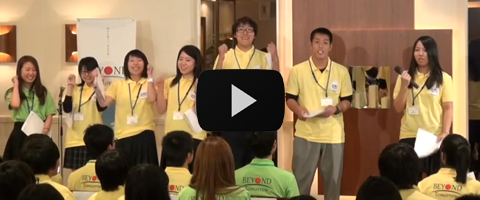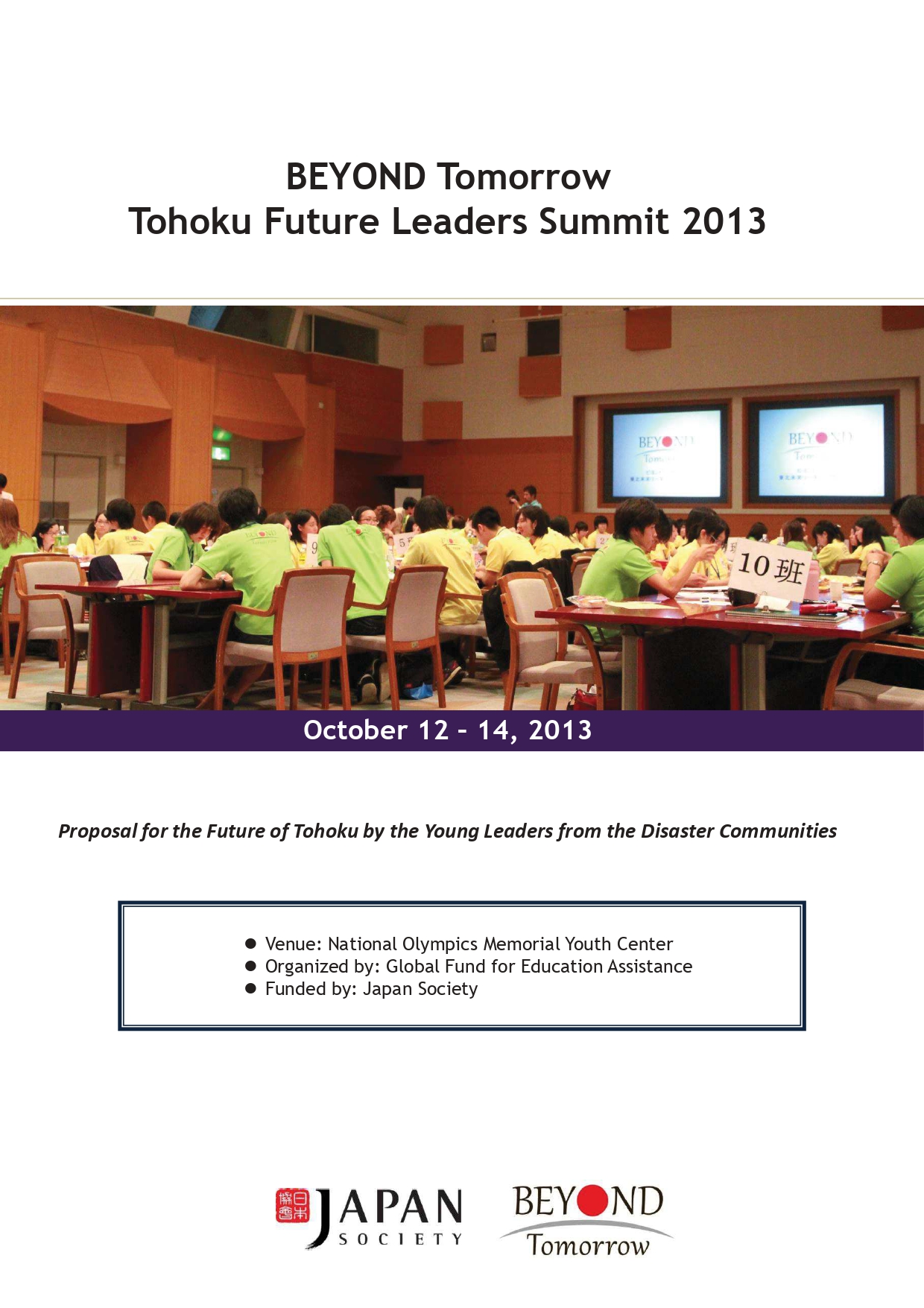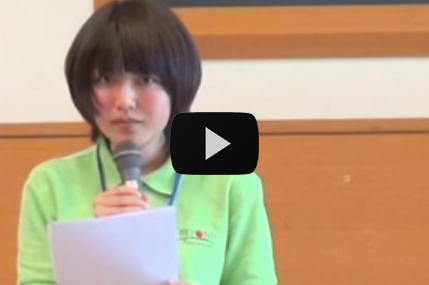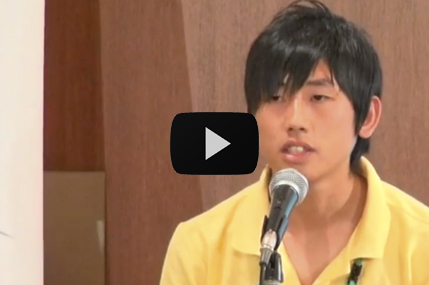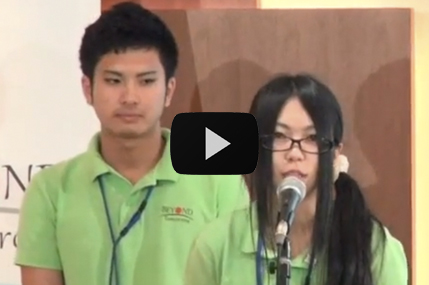BEYOND Tomorrow Tohoku Future Leaders Summit 2013
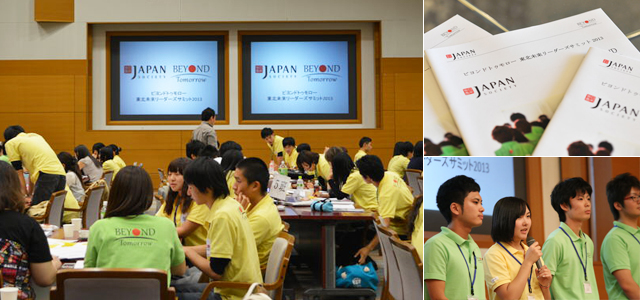
Overview
BEYOND Tomorrow hosted the Tohoku Future Leaders Summit 2013, which was the third time since its first Summit in 2011. This Summit targets young people who, despite facing great adversity, maintain a global outlook and have aspirations to actively work on both domestic and international platforms. Together with 59 high school students who were selected on an application basis, 22 university students were also selected to attend, based on their active contribution to society and other BEYOND Tomorrow programs after having experienced the disaster first-hand in Iwate, Miyagi, or Fukushima prefectures. The students divided into groups, and as a group created proposals under the guidance of established leaders in various fields. We believe that precisely because they have experienced the tragedy of the earthquake and tsunami, these students are able to become empathetic activists and serve a larger society. At this Summit the students, as survivors of the disaster, reflected on what roles in society they must fulfill and how to convert these ideas into action.Objectives
- To create Proposals to the Future of Tohoku Based on personal experiences as well as the opinions of locals, students will discuss how Tohoku should work towards recovery, create a proposal, and present it.
- Each student to define a specific vision for his/her future upon interacting with leaders active in different fields Upon speaking with various leaders, students will reflect on what role in society they would like to fulfill, in particular as someone who has first-hand experience of the earthquake and tsunami.
- To build strong bonds among the students through discussion of their shared ambitions and exchange of opinions
Dates and Locations
October 12 – 14, 2013 National Olympic Memorial Youth Center(Shibuya, Tokyo)Participants
High School Students
59 high school students who were living in Iwate, Miyagi, or Fukushima prefectures during the Great East Japan Earthquake and tsunami were selected through rigorous application process. The applicants who, despite facing the adversity, hold strong aspirations and determination to become global leaders and contribute to society in a domestic and international domain participated in the Summit.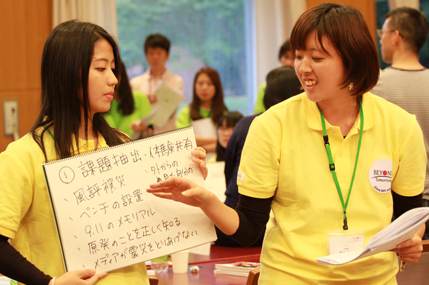
BEYOND Tomorrow Tohoku Future Fellows Program Participants (Fellows)
11 university students who are the participants of BEYOND Tomorrow Future Fellows Program played a role as Team Leaders, who supported high school students during the 3-days program.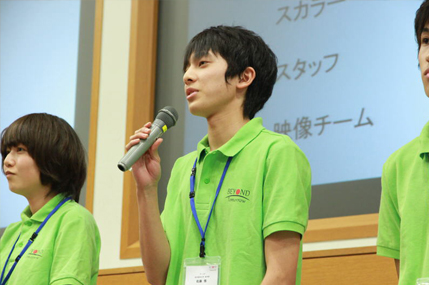
BEYOND Tomorrow College Scholarship Program Participants (Scholars)
11 university students who are the participants of BEYOND Tomorrow College Scholarship Program formed their own team to address a case study in addition to advising Tohoku Future Fellows Program participants.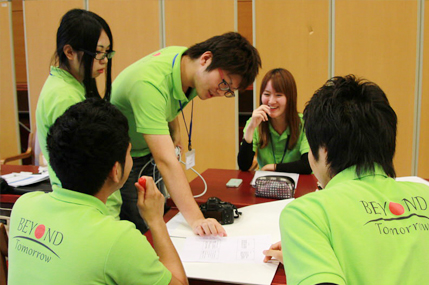
Policy Advisors
Advisors, who are active in various fields, were assigned to each student group, and the advisors offered support for the students in their discussions. Each student also received guidance when thinking about his or her future path in the context of Tohoku’s recovery.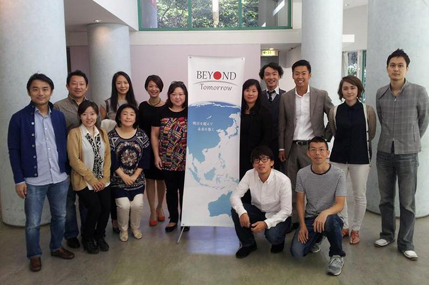
- Daisuke Iwase
- President & COO, LIFENET INSURANCE COMPANY
- Etsuko Okajima
- President, ProNova Inc.
- Koji Kagoshima
- Creative director, Social Design Engine, Dentsu Inc.
- Daisuke Sugiyama
- Founder / CEO, INTERLITERACY
- Tomoko Teruya
- CEO/Founder, NGO Yuimar
- Seigo Hara
- McKinsey & Company
- Emmy Suzuki Harris
- Founder and Campaigns Director, Change.org Japan
- Kumi Fujisawa
- Co-Founder, Think Tank SophiaBank
- Chikara Funabashi
- Founder & Chairman, Will Seed Corporation
- Mayo Hotta
- SoftBank Corp.
- Nami Matsuko
- Managing Director, Head of Corporate Citizenship Department, Nomura Holdings Inc.
- Hiroaki Yabe
- Youth Venture Programmatic Leader, Ashoka Japan
Experts
When discussing Tohoku’s reconstruction, students received input from an expert from each field.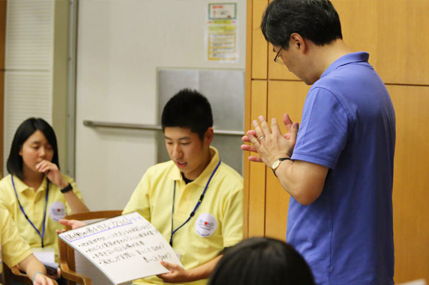
Program Highlight
Sharing Disaster Experience
Nearly three years have passed since the Great East Japan Earthquake and tsunami. What is the meaning of gathering together from Tohoku? Do we still need to talk about the disaster? What is the point of having both victims and non-victims think about the recovery process? Remembering their own memory of “March 11, 2011”, each participating student faced their experiences. By listening to, accepting, and empathizing with their peers, each and every participating student created their own special space for reflection.BEYOND Tomorrow Night
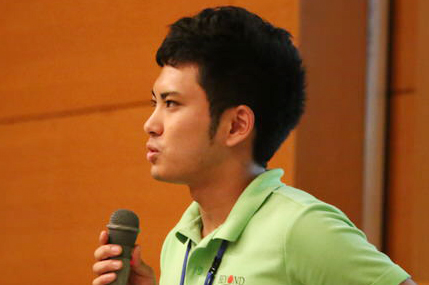
Even if told to speak honestly of your thoughts, you may wonder what to say or what to ask your peers. It may result in silence. But I believe that this silence is “meaningful chaos”. This session is not intended to find an answer but to share our thoughts. I want you to start with the words or phrases that come to mind. I know it’s scary to speak your thoughts, but that’s an important place to start.
Masahide Chiba Faculty of Policy Management, Keio University (Ofunato High School graduate)
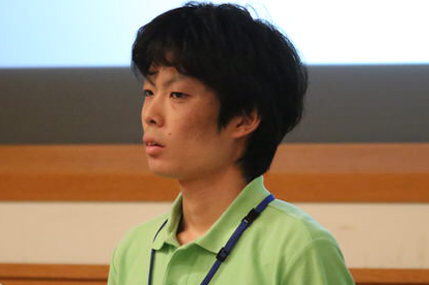
Though I am from a more inland area, I participated in the first Summit two years ago, because I wanted to do something for the affected areas. One friend I had made was from there and had lost his parents. I thought I knew the disaster from the media, but felt that the reality of the disaster was beginning to affect me for the first time. Since participating in the Summit, I learned a great deal from my peers. Though I know that I cannot 100% understand their feelings. This experience has driven me to think about what I can do for the affected areas in Tohoku. Those are the feelings that you are able to take away from this Summit. While you might not know exactly what to say, once you overcome as situation like this, there are many gains to be made. Tomohiro Kamisawa Faculty of Agriculture, Tohoku University (Morioka First High School graduate)
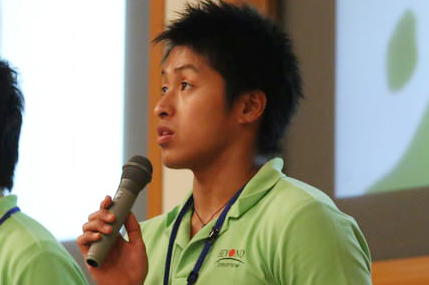
After the disaster, I left my home of Kesennuma to continue pursuing my passion for swimming in a high school in Kanagawa. I was bewildered by the huge gap between Miyagi, where I’m from, and Kanagawa, where I moved to after the disaster. Kanagawa had an aura of peace as if the disaster never really happened. At night, I would remember I had lost my house, and it made me want to return to Kesennuma to do something for my hometown. Having only lived in the affected area for two months after the disaster struck, I wasn’t sure if I have a right to participate in the Summit at all. But I also thought I might be able to positively influence those who were in similar situations. I’ll never forget those three days that gave me the chance to talk express my feelings, something I would never be able to talk about with other friends.
Shinpei Fujita Faculty of Law, Kanagawa University (Kishine High School graduate)
Speech of the Student Representative
Even if it is hard to talk about it, because we are the victims, we have a responsibility to communicate our experiences to those who did not experience the disaster, those who will carry the future. I made this my resolution. To me, encountering BEYOND Tomorrow was a revolutionary moment. To my mother: thank you.I am now living my life to the fullest.
Kaede Sakuma School of Art, Tohoku University of Art and Design (Ishinomaki Municipal Girl’s Senior High School graduate)
Discussion Topic
In the morning of Day 2, the participating students were asked to develop plans for the Tohoku’s future.You carry the future of Tohoku. Over these three days, I urge you to think and discuss together to develop a proposal for a bright future.
Message for BEYOND Tomorrow Tohoku Future Leaders Summit 2013
I am extremely pleased to hear that high school and college student representatives of the Tohoku region have gathered today to attend the BEYOND Tomorrow Tohoku Future Leaders Summit 2013. I first learned of your activities during the Spring Program this March, and I was deeply impressed that, despite all of your difficult experiences, you embody such passion to face forward and build the future together. It has now been over two years since the disaster, but Tohoku’s recovery is still in need of a long-term plan. I believe that you, the young generation, are the ones who carry Tohoku’s future, and as such, I hope that you, as true representatives of the region, will help guide this process with your leadership skills. There are many challenges to Tohoku’s recovery, such as the relocating to higher ground, planning tide embankments, and constructing new roads. I believe that it is wonderful that you are creating proposals on these themes. I am very much looking forward to hearing the ideas that you come up with. While I regretfully cannot attend your proposal presentation session on the 14th, I would like to extend an invitation to the winning team and the university team conducting the case studies to present their ideas at the Prime Minister’s Official Residence. You carry the future of Tohoku. Over these three days, I urge you to think and discuss together to develop a proposal for a bright future. I wish you a great success at the Tohoku Future Leaders Summit.Akie Abe
- Developing an Attracting City
- Conveying Messages from Tohoku
- Cross-Generational Cooperation
Understanding the Needs of Tohoku
As a first step of creating the proposal, participating students researched the current needs of the affected area. What are needed in Tohoku? What is the most appropriate policy for the region? Participating students, who had conducted interviews with three locals from the affected region prior to Summit, shared the results with their teams and deepened the discussion.Shared Needs of Tohoku
I feel that not having any physical reminders of the disaster is problematic. Tohoku does not have anything like Hiroshima’s A-Bomb Dome that serves as a peace memorial. Without any physical reminders of the disaster, what will be left in 50 or 100 years? We have a mission to confront the disaster and communicate it to future generations. In order to do this, we will need some symbolic remnant of the disaster.
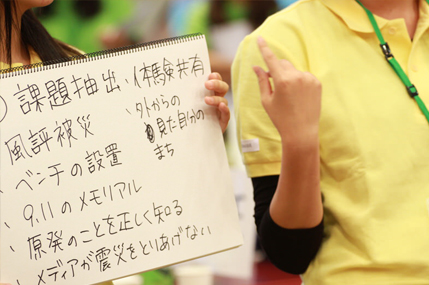
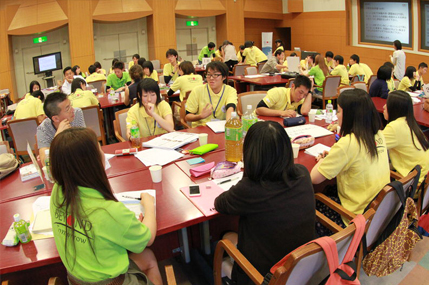
Something I learned from the interviews was that victims of the disaster don’t necessarily hold the same opinions. Some say that we should take the views of local residents into consideration and some say we shouldn’t. Merely absorbing all the local opinions doesn’t seem like the best thing to do. Realistically, it is very difficult to incorporate all the opinions. Perhaps we shouldn’t leave all the decisions to politicians but consider leaving local residents some room to make their own decisions.
Interviews with Specialists
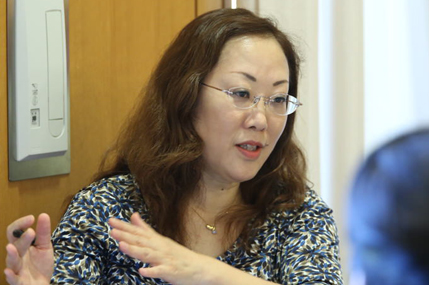
In order to reach a consensus on a certain matter, you must have an ownership in that matter. The most important thing is that the people of a community choose their own life. When involving them, you must have a thorough discussion. People who come to help can only play a facilitating role. People already have the potential to stand on their own feet. Your role as facilitators is to speed up the process if even by a little.
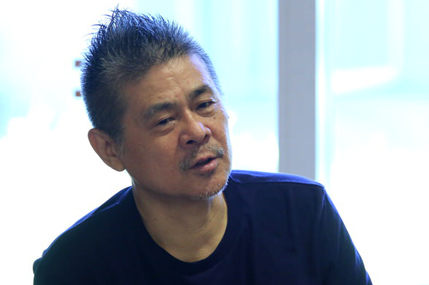
Everyone is focusing too much on “conveying” the information. What’s important is what comes before the “conveying.” People are interested in what you think about the disaster on March 11th and what kind of things you are truly committed to. They will ask what you are doing besides “conveying,” which seems much more important.
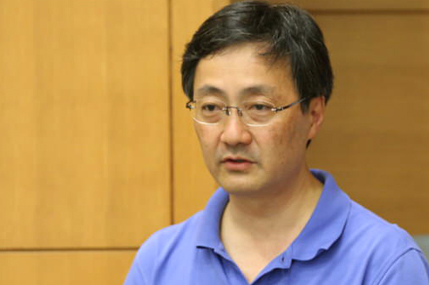
There are perhaps many adults who believe that “The government will do it” or “Corporations will do it,” while very few actually think “We should do it.” If high school students take the initiative to solve societal issues, that will inspire adults. Everyone hopes future generations will live better than the current generation, so by being proactive, the next generation will inspire the adults. This may be your biggest advantage.
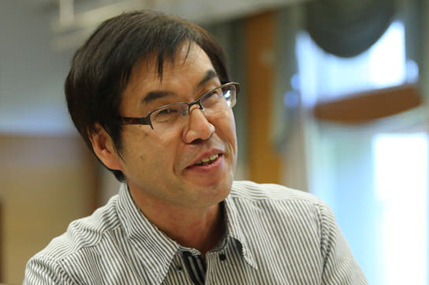
Unlike in the U.S., in Japan, there is no legal framework for civil participation in constructing coastal levee, so it is difficult to reflect the opinions of the citizens in the policy. When constructing coastal levee, we cannot wait five or ten years for citizens to come to a consensus as the coastal levee is something that involves people’s lives. The result is that the government takes a top-down approach in advancing the construction plans. The status quo in Japan is that it is difficult to wait for citizens to form a consensus. But since there are many examples in the world where the participation of citizens are properly taken into consideration, it is possible that the Japanese system will move in the direction as well.
Final Presentations of Proposals
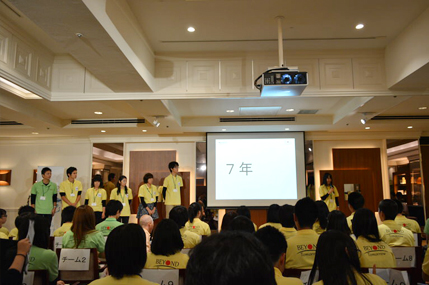
Special Message
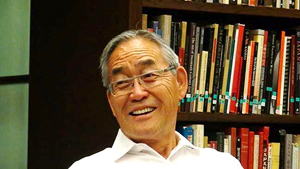
While this Summit is a first step for those of you from Tohoku to play a role in its recovery, it also requires cooperation from all of Japan. Furthermore, I believe that it is important to think a step ahead and consider what kind of support you could seek from the international community, thus approaching recovery with a broad perspective. While doing so, I imagine that you will grow and come up with even better ideas for the recovery of Tohoku.
Message from Guest
Today, as this is the Tohoku Future Leaders Summit, you are leaders. From now on, I want you all to go through even more challenging experiences as leaders. Being a leader is challenging, but you will be able to become leaders precisely because you have overcome some very painful experiences. I would like you to remember the idea that “adversity makes great leaders,” the founding idea of BEYOND Tomorrow.
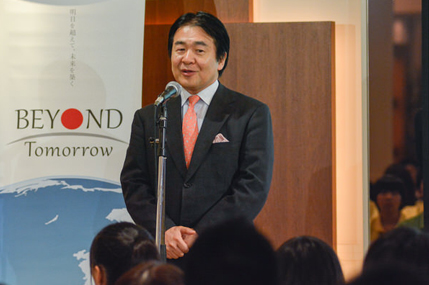
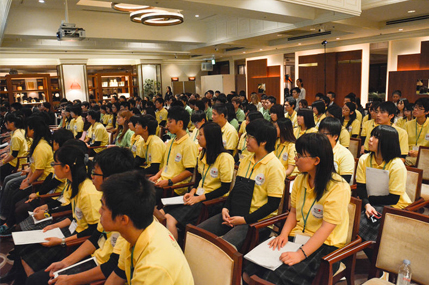
Leaders face risks all the time, and there is always some argument against a course of action. Leaders must contain the opposing arguments and manage the risks while keeping the team together. Gorbachev once said that “All reformers are unhappy”. Whenever you try to do something that hasn’t been done, you will always run into a lot of criticism and skepticism. If you blaze a new trail, nobody is going to care who did so. People will just use that trail as if it had been there all along. That is the leader and the reformer. I want you all to hold your heads high and become that kind of leader.
Student Speeches
Until recently, I kept on living filled with regrets about my mother’s death. But thanks to BEYOND, I’ve come to believe that instead of chasing things that are not there, I need to appreciate the things that exist now and to continue believing in the things that are to come.
Shun Sato Miyagi Agricultural High School
This is a completely unexpected development for me compared to two years ago. With the opportunities I was given, I have been able to involve myself in society so much more.
Minori Endo Sophomore, School of Business Administration, Ishinomaki Senshu University (Ishinomaki Kita High School graduate) Masahide Chiba Freshman, Faculty of Policy Management (Ofunato High School graduate)
Presentation at the Prime Minister’s Official Residence
At the three-day program, future leaders made proposals for the future of Tohoku. The winning team (Team 5) and the university students were invited to the Prime Minister’s Official Residence and delivered their proposals to First Lady Akie Abe.You, the young generation, are the ones who will keep living. As such, I offer my utmost support to your work, so that your proposals can become a reality. Dream big, and I look forward to seeing you as the symbol of the Japanese people’s dreams for the future. First Lady Akie Abe
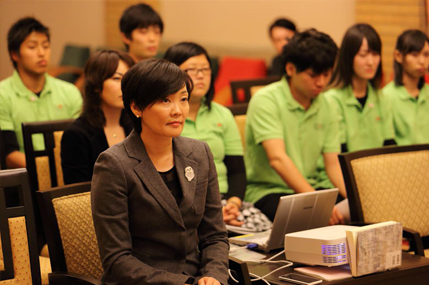
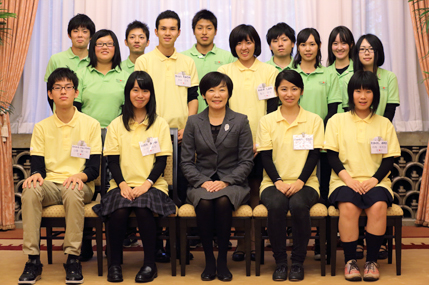
Media Appearances
- FUKUSHIMA MINPO (September 1, 2013)
- Iwate Nippo (September 1, 2013)
- Denki Shinbun (September 11, 2013)
- Tohkai Shimpo (September 12, 2013)
- Iwate Nippo (October 14, 2013)
- Recruit Shingaku Journal
Sponsor
 Japan Society
Japan Society

